How to Become a Licensed Counselor: State Requirements & Licensing Guide
A typical path to counselor licensure is: earn a 60-credit master's in counseling or a closely related field, complete approximately 2,000- 4,000+ hours of supervised post-master experience (varies by state), and pass a national exam (usually the NCE or NCMHCE). Many states also require a short jurisprudence (laws and rules) exam. Example: Florida requires 1,500 supervised hours and the NCMHCE for LMHCs; the NCE is accepted only for certain endorsement cases.
Counselors play a vital role in communities by helping people navigate serious mental, emotional, and behavioral challenges. They provide diagnosis, support, and treatment that enable individuals to lead healthier, more successful lives. Whether someone is struggling with anxiety, relationship issues, substance abuse, or life transitions, counselors offer the professional expertise needed to facilitate positive change.
Because states are deeply invested in protecting their citizens' welfare, each maintains rigorous licensing standards to ensure counselors are thoroughly qualified. These requirements cover everything from educational credentials and supervised clinical hours to examination performance and continuing education. While the core pathway remains similar across states, specific requirements can vary significantly, from 1,500 hours of supervision in Florida to 4,500 hours in New Jersey.
We've built a comprehensive database with detailed counseling licensure requirements for every state. This guide gives aspiring counselors and psychology students the information they need to make informed decisions about their career path, whether they're just starting their education or preparing to apply for licensure.
The General Pathway to Counselor Licensure
While each state sets its own specific requirements, the journey to becoming a licensed professional counselor follows a consistent pattern across the United States. Understanding this general framework helps you plan your education and career timeline effectively.
Most states require a master's degree in counseling, clinical mental health counseling, or a closely related field from a regionally accredited institution. Your program should include 60 credit hours of coursework covering areas like counseling theory, ethics, assessment, diagnosis, treatment planning, and multicultural counseling. Many states specifically require programs accredited by the Council for Accreditation of Counseling and Related Educational Programs (CACREP), though some accept equivalent non-CACREP programs that meet state curriculum standards.
After completing your degree, you'll enter a supervised post-graduate clinical experience period. Supervision requirements typically fall between approximately 2,000 and 4,000+ hours after your master's, but some states require more. For example, New Jersey requires 4,500 hours for LPC licensure. Always check your state board's current rules for exact requirements. During this time, you'll work in approved clinical settings while receiving regular supervision to develop your counseling skills and professional judgment.
The final primary requirement is passing one or more national examinations. The National Counselor Examination (NCE) and the National Clinical Mental Health Counseling Examination (NCMHCE) are the most widely accepted tests. Many states also require a jurisprudence exam that covers state-specific laws, regulations, and ethical standards. From start to finish, expect the licensure process to take 6-8 years: 4 years for your bachelor's degree, 2-3 years for your master's degree, and 2-3 years of post-graduate supervised experience.
The path to licensure requires a master's degree, which represents a significant investment. Offset education costs by applying for mental health counseling scholarships designed for graduate students.
Search Accredited Counseling Programs
State-by-State Counseling License Requirements
Each state establishes its own licensing requirements for professional counselors. The table below provides a quick overview of requirements across all 50 states. Click on any state name to access detailed licensing information.
| State | Summary of License Requirements | Education Requirement |
|---|---|---|
 Alabama |
Education: Master's degree in counseling Supervised Hours: 3,000 hours Examination: NCE Read the complete Alabama licensing guide |
Master's in Counseling |
 Alaska |
Education: Master's degree in counseling Supervised Hours: Two years (approximately 4,000 hours) Examination: NCE View detailed Alaska requirements below |
Master's in Counseling |
 Arizona |
Education: Master's degree in counseling Supervised Hours: Two years (approximately 3,200 hours) Examination: NCE or NCMHCE Read the complete Arizona licensing guide |
Master's in Counseling |
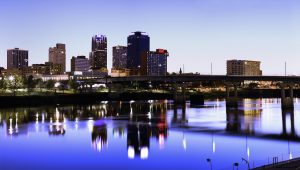 Arkansas |
Education: Master's degree in counseling Supervised Hours: Three years (approximately 6,000 hours) Examination: NCE Read the complete Arkansas licensing guide |
Master's in Counseling |
 California |
Education: Master's degree in counseling Supervised Hours: 3,000 hours Examination: NCMHCE and California LPCC Law & Ethics Exam Read the complete California licensing guide |
Master's in Counseling |
 Colorado |
Education: Master's degree in counseling Supervised Hours: 3,000 hours Examination: NCE and Colorado Jurisprudence Exam Read the complete Colorado licensing guide |
Master's in Counseling |
 Connecticut |
Education: Master's degree in counseling Supervised Hours: 3,200 hours Examination: NCE View detailed Connecticut requirements below |
Master's in Counseling |
 Delaware |
Education: Master's degree in counseling Supervised Hours: 1,600 hours Examination: NCE View detailed Delaware requirements below |
Master's in Counseling |
 Florida |
Education: Master's degree in counseling Supervised Hours: 1,500 hours Examination: NCMHCE (NCE accepted only for some endorsement pathways) Read the complete Florida licensing guide |
Master's in Counseling |
 Georgia |
Education: Master's degree in counseling Supervised Hours: At least two years (minimum 3,000 hours) Examination: NCMHCE or NCE Read the complete Georgia licensing guide |
Master's in Counseling |
 Hawaii |
Education: Master's degree in counseling Supervised Hours: 3,000 hours Examination: NCE Read the complete Hawaii licensing guide |
Master's in Counseling |
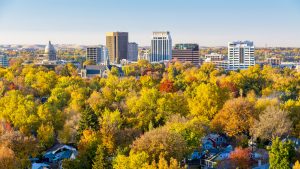 Idaho |
Education: Master's degree in counseling Supervised Hours: 1,000 hours Examination: NCE Read the complete Idaho licensing guide |
Master's in Counseling |
 Illinois |
Education: Master's degree in counseling Supervised Hours: 3,360 hours (1,600 direct client contact) Examination: NCE or NCMHCE Read the complete Illinois licensing guide |
Master's in Counseling |
 Indiana |
Education: Master's degree in counseling Supervised Hours: 1,000 hours Examination: NCMHCE Read the complete Indiana licensing guide |
Master's in Counseling |
 Iowa |
Education: Master's degree in counseling Supervised Hours: 3,000 hours (1,500 direct client contact) Examination: NCE, NCMHCE, or CRCE Read the complete Iowa licensing guide |
Master's in Counseling |
 Kansas |
Education: Master's degree in counseling Supervised Hours: 4,000 hours Examination: NCE or NCMHCE View detailed Kansas requirements below |
Master's in Counseling |
 Kentucky |
Education: Master's degree in counseling Supervised Hours: 4,000 hours Examination: NCE Read the complete Kentucky licensing guide |
Master's in Counseling |
 Louisiana |
Education: Master's degree in counseling Supervised Hours: 2,000 hours Examination: NCE Read the complete Louisiana licensing guide |
Master's in Counseling |
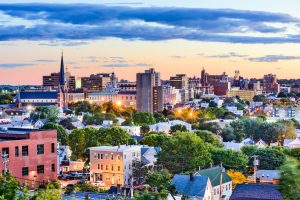 Maine |
Education: Master's degree in counseling Supervised Hours: 3,000 hours Examination: NCE Read the complete Maine licensing guide |
Master's in Counseling |
 Maryland |
Education: Master's degree in counseling Supervised Hours: 3,250 hours Examination: NCMHCE Read the complete Maryland licensing guide |
Master's in Counseling |
 Massachusetts |
Education: Master's degree in counseling Supervised Hours: Two years of supervised experience Examination: State examination Read the complete Massachusetts licensing guide |
Master's in Counseling |
 Michigan |
Education: Master's degree in counseling Supervised Hours: 3,000 hours Examination: NCE or CRCC Read the complete Michigan licensing guide |
Master's in Counseling |
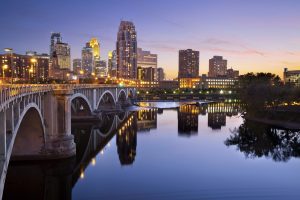 Minnesota |
Education: Master's degree in counseling Supervised Hours: 4,000 hours Examination: EPPP, NCE, NCMHCE, or CRCE Read the complete Minnesota licensing guide |
Master's in Counseling |
 Mississippi |
Education: Master's degree in counseling Supervised Hours: 3,500 hours Examination: NCE Read the complete Mississippi licensing guide |
Master's in Counseling |
 Missouri |
Education: Master's degree in counseling Supervised Hours: 3,000 hours Examination: NCE Read the complete Missouri licensing guide |
Master's in Counseling |
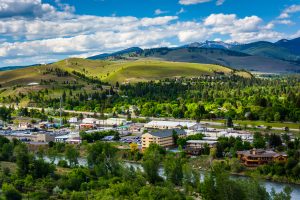 Montana |
Education: Master's degree in counseling Supervised Hours: 3,000 hours Examination: NCE or NCMHCE Read the complete Montana licensing guide |
Master's in Counseling |
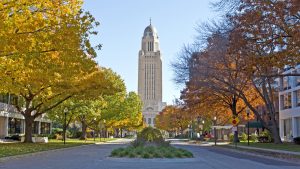 Nebraska |
Education: Master's degree in counseling Supervised Hours: 3,000 hours Examination: NCE or NCMHCE Read the complete Nebraska licensing guide |
Master's in Counseling |
 Nevada |
Education: Master's degree in counseling Supervised Hours: 3,000 hours Examination: NCE or NCMHCE Read the complete Nevada licensing guide |
Master's in Counseling |
 New Hampshire |
Education: Master's degree in counseling Supervised Hours: 3,000 hours Examination: NCE Read the complete New Hampshire licensing guide |
Master's in Counseling |
 New Jersey |
Education: Master's degree in counseling Supervised Hours: 4,500 hours Examination: NCE Read the complete New Jersey licensing guide |
Master's in Counseling |
 New Mexico |
Education: Master's degree in counseling Supervised Hours: 3,000 hours Examination: NCE or NCMHCE Read the complete New Mexico licensing guide |
Master's in Counseling |
 New York |
Education: Master's degree in counseling Supervised Hours: 3,000 hours Examination: NCMHCE Read the complete New York licensing guide |
Master's in Counseling |
 North Carolina |
Education: Master's degree in counseling Supervised Hours: 3,000 hours Examination: NCE, NCMHCE, or CRCE Read the complete North Carolina licensing guide |
Master's in Counseling |
 North Dakota |
Education: Master's degree in counseling Supervised Hours: Two years of supervised experience Examination: NCE View detailed North Dakota requirements below |
Master's in Counseling |
 Ohio |
Education: Master's degree in counseling Supervised Hours: Two years of supervised experience Examination: NCE or NCMHCE Read the complete Ohio licensing guide |
Master's in Counseling |
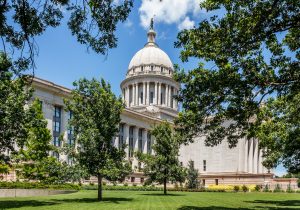 Oklahoma |
Education: Master's degree in counseling Supervised Hours: Three years (approximately 6,000 hours) Examination: NCE and Oklahoma Jurisprudence Exam View detailed Oklahoma requirements below |
Master's in Counseling |
 Oregon |
Education: Master's degree in counseling Supervised Hours: 2,400 hours Examination: NCE Read the complete Oregon licensing guide |
Master's in Counseling |
 Pennsylvania |
Education: Master's degree in counseling Supervised Hours: 3,600 hours Examination: NCE, EMAC, or CRC Read the complete Pennsylvania licensing guide |
Master's in Counseling |
 Rhode Island |
Education: Master's degree in counseling Supervised Hours: 2,000 hours Examination: NCMHCE View detailed Rhode Island requirements below |
Master's in Counseling |
 South Carolina |
Education: Master's degree in counseling Supervised Hours: 1,500 hours Examination: NCE or NCMHCE Read the complete South Carolina licensing guide |
Master's in Counseling |
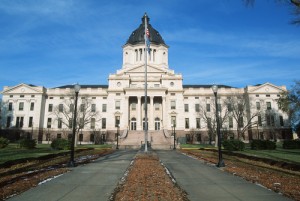 South Dakota |
Education: Master's degree in counseling Supervised Hours: 2,000 hours Examination: NCE View detailed South Dakota requirements below |
Master's in Counseling |
 Tennessee |
Education: Master's degree in counseling Supervised Hours: Two years of supervised experience Examination: NCE and Tennessee Jurisprudence Exam Read the complete Tennessee licensing guide |
Master's in Counseling |
 Texas |
Education: Master's degree in counseling Supervised Hours: 3,000 hours Examination: NCE and Texas Jurisprudence Exam Read the complete Texas licensing guide |
Master's in Counseling |
 Utah |
Education: Master's degree in counseling Supervised Hours: 1,000 hours Examination: NCE or NCMHCE Read the complete Utah licensing guide |
Master's in Counseling |
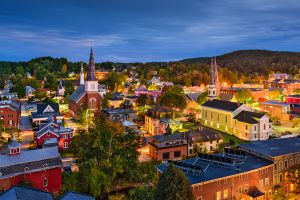 Vermont |
Education: Master's degree in counseling Supervised Hours: 3,000 hours Examination: NCE or NCMHCE Read the complete Vermont licensing guide |
Master's in Counseling |
 Virginia |
Education: Master's degree in counseling Supervised Hours: 4,000 hours Examination: NCMHCE Read the complete Virginia licensing guide |
Master's in Counseling |
 Washington |
Education: Master's degree in counseling Supervised Hours: 3,000 hours Examination: NCE or NCMHCE Read the complete Washington licensing guide |
Master's in Counseling |
 West Virginia |
Education: Master's degree in counseling Supervised Hours: 3,000 hours Examination: NCE View detailed West Virginia requirements below |
Master's in Counseling |
 Wisconsin |
Education: Master's degree in counseling Supervised Hours: 3,000 hours Examination: NCE, NCMHCE, or CRCC Read the complete Wisconsin licensing guide |
Master's in Counseling |
 Wyoming |
Education: Master's degree in counseling Supervised Hours: 3,000 hours Examination: NCE, NCMHCE, or CRCC View detailed Wyoming requirements below |
Master's in Counseling |
Every state licensing board emphasizes ethical practice and appropriate client relationships in their requirements. Before beginning supervised hours, familiarize yourself with professional boundary guidelines for mental health practitioners to ensure you maintain ethical standards throughout your training.
Detailed State Licensing Requirements
The following states have their complete licensing requirements detailed on this page. Each section provides comprehensive information about education, supervision, examination, and application requirements specific to that state.
Alaska Licensed Professional Counselor Requirements
Alaska licenses professional counselors through the Board of Professional Counselors. The state requires a master's degree from a regionally accredited institution with at least 60 semester hours of graduate coursework in counseling or a closely related field. Your program must include specific coursework in counseling theory, human growth and development, social and cultural foundations, helping relationships, group work, career development, assessment, research and program evaluation, and professional orientation and ethics.
After completing your degree, you'll need to accumulate two years of post-graduate supervised professional experience. This typically translates to approximately 4,000 hours of supervised practice. At least 100 hours must be direct, face-to-face supervision with an approved supervisor who holds an independent license in a mental health field. Your supervisor will evaluate your clinical skills, ethical decision-making, and professional development throughout this period.
Alaska requires candidates to pass the National Clinical Mental Health Counselor Examination (NCE) administered by the National Board for Certified Counselors. You must achieve a passing score as determined by the NBCC. The state also requires completion of an Alaska-specific jurisprudence examination covering state laws, regulations, and ethical standards governing counseling practice.
To apply for licensure, submit a complete application to the Alaska Board of Professional Counselors, including official transcripts, verification of supervised experience, examination scores, and the required fees. Background checks and professional references are also required. Once licensed, you'll need to complete continuing education requirements for renewal every two years.
Connecticut Licensed Professional Counselor Requirements
Connecticut's Department of Public Health oversees professional counselor licensing. The state requires a master's or doctoral degree in counseling from a regionally accredited institution. Your program must include at least 60 graduate semester hours with specific coursework in eight core areas: human growth and development, social and cultural diversity, helping relationships, group dynamics, career development, appraisal and assessment, research and program evaluation, and professional orientation and ethics.
You'll need to complete 3,200 hours of post-master's supervised clinical experience, with at least 1,600 hours in direct client contact. This supervision must occur over a minimum of two years and include at least 100 hours of face-to-face supervision with a qualified licensed mental health professional. Your supervisor must hold an active, unrestricted license and have at least two years of post-licensure experience.
Connecticut accepts the National Counselor Examination (NCE) as its licensing examination. The exam tests your knowledge of counseling theory, human development, assessment, treatment planning, and ethical practice. You must achieve the passing score established by the National Board for Certified Counselors.
The application process requires submission of official transcripts, detailed supervision documentation, examination scores, professional references, and completion of a criminal background check. Connecticut also requires applicants to complete training in identifying and reporting child abuse and intimate partner violence. License renewal occurs every two years and requires completion of continuing education credits.
Delaware Licensed Professional Counselor of Mental Health Requirements
Delaware's Board of Professional Counselors of Mental Health licenses qualified counselors to practice independently. The state requires a master's or doctoral degree in counseling, counseling psychology, or a closely related field from a regionally accredited institution. Your program must include at least 48 graduate semester hours, though most qualifying programs contain 60 hours. Required coursework covers counseling theory and practice, human growth and development, multicultural counseling, group counseling, career counseling, appraisal and assessment, research methods, and professional ethics.
Delaware requires 1,600 hours of post-graduate supervised clinical experience, which must be completed over at least one year. This relatively modest requirement compared to other states makes Delaware an attractive option for those seeking faster licensure. Your supervised experience must include direct client contact and regular supervision sessions with an approved licensed mental health professional who has at least two years of post-licensure experience.
Candidates must pass the National Clinical Mental Health Counselor Examination (NCE) administered by the National Board for Certified Counselors. The exam assesses your competency in fundamental counseling knowledge areas, including assessment, diagnosis, treatment planning, counseling skills, and professional practice. Delaware accepts the NBCC's passing standard for this examination.
To apply for licensure, submit official transcripts documenting your degree and coursework, verification forms signed by your clinical supervisor detailing your supervised experience hours, NCE scores, professional references, and a completed application with fees. The state conducts criminal background checks on all applicants. Once licensed, you must complete 24 hours of continuing education every two years, including specific training in ethics and Delaware laws and regulations.
Kansas Licensed Professional Counselor Requirements
Kansas licenses professional counselors through the Behavioral Sciences Regulatory Board. The state requires a master's or doctoral degree in counseling from a regionally accredited institution with at least 60 graduate semester hours. Kansas strongly prefers graduates from programs accredited by the Council for Accreditation of Counseling and Related Educational Programs (CACREP). Your coursework must cover the eight core counseling areas: professional identity, social and cultural diversity, human growth and development, career development, helping relationships, group work, assessment, and research.
Kansas requires one of the most extensive supervision periods in the nation: 4,000 hours of post-master's supervised professional experience. These hours must be accumulated over a minimum of two years, with at least 2,000 hours in direct client contact. You'll need 100 hours of face-to-face supervision, with at least 50 hours being individual supervision. Your supervisor must be a licensed professional counselor, psychologist, or clinical social worker with at least two years of post-licensure experience.
Candidates can choose between two national examinations: the National Counselor Examination (NCE) or the National Clinical Mental Health Counseling Examination (NCMHCE). Both are administered by the National Board for Certified Counselors and assess different aspects of counseling competency. The NCE focuses on general counseling knowledge, while the NCMHCE emphasizes clinical mental health counseling skills through simulated case scenarios.
The application process requires submission of official transcripts, detailed supervision logs verified by your supervisor, examination scores, three professional references, and completion of a criminal background check. Kansas also requires applicants to take a jurisprudence examination covering Kansas-specific laws and regulations. License renewal occurs annually and requires completion of continuing education hours, including mandatory training in suicide prevention and domestic violence.
North Dakota Licensed Professional Clinical Counselor Requirements
North Dakota's Board of Counselor Examiners oversees licensure for professional clinical counselors. The state requires a master's or doctoral degree in counseling or a closely related field from a regionally accredited institution. Your program must include at least 60 graduate semester hours with coursework covering the core areas of professional counseling: counseling theory and practice, human development, multicultural and diversity issues, diagnosis and treatment planning, career development, assessment, research and evaluation, group counseling, and professional ethics.
You'll need to complete two years of post-graduate supervised clinical experience totaling at least 2,000 hours, with a minimum of 1,000 hours in direct client contact. North Dakota requires 100 hours of supervision, with at least half being individual face-to-face supervision. Your supervisor must hold an independent mental health license and have at least two years of post-licensure clinical experience. The supervision relationship must focus on developing your clinical skills, ethical decision-making, and professional identity.
North Dakota requires passage of the National Clinical Mental Health Counselor Examination (NCE) administered by the National Board for Certified Counselors. This comprehensive exam tests your knowledge of counseling fundamentals, including human development, assessment, counseling theory, treatment planning, and ethics. You must achieve the passing score established by NBCC.
The application process includes submission of official transcripts, verification of your supervised experience signed by your supervisor, NCE scores, three professional references, and completion of a criminal background check. North Dakota also requires completion of a state-specific jurisprudence exam covering North Dakota laws and regulations governing counseling practice. Once licensed, you'll renew annually and complete continuing education requirements, including mandatory training in ethics and North Dakota statutes.
Oklahoma Licensed Professional Counselor Requirements
Oklahoma's Licensed Professional Counselors Act governs counselor licensure through the Oklahoma State Board of Behavioral Health Licensure. The state requires a master's degree in counseling or a closely related field from a regionally accredited institution with at least 60 graduate semester hours. Oklahoma prefers graduates from CACREP-accredited programs. Your coursework must include the core counseling areas: counseling theory, human growth and development, social and cultural foundations, helping relationships, group work, career and lifestyle development, appraisal and assessment, research and program evaluation, and professional orientation and ethics.
Oklahoma requires three years of post-graduate supervised professional experience, which translates to approximately 6,000 hours. During this time, you must accumulate at least 3,000 hours of direct client contact under supervision. You'll need at least 150 hours of face-to-face supervision, with a minimum of 50 hours being individual supervision. Your supervisor must be a licensed mental health professional with at least two years of post-licensure experience and must have completed supervisor training approved by the board.
Candidates must pass the National Clinical Mental Health Counselor Examination (NCE) administered by the National Board for Certified Counselors. Oklahoma also requires passage of the Oklahoma Jurisprudence Examination, which tests your knowledge of Oklahoma-specific laws, regulations, and ethical standards governing counseling practice. Both examinations must be passed before you can be granted full licensure.
To apply for licensure, submit official transcripts, detailed supervision logs verified by your supervisor, examination scores, three professional references, and completion of a criminal background check. Oklahoma issues an initial five-year license, after which you'll renew every two years. Continuing education is required for renewal, including specific coursework in ethics, suicide prevention, domestic violence, and the recognition and reporting of child abuse.
Rhode Island Licensed Mental Health Counselor Requirements
Rhode Island's Department of Health Board of Mental Health Counselors and Marriage and Family Therapists licenses qualified mental health counselors. The state requires a master's or doctoral degree in mental health counseling, counseling psychology, or a closely related field from a regionally accredited institution. Your program must include at least 60 graduate semester hours with coursework in counseling theory and practice, human development, social and cultural foundations, helping relationships and techniques, group work, career and lifestyle development, appraisal and assessment, research and program evaluation, and professional ethics.
Rhode Island requires 2,000 hours of post-graduate supervised clinical experience, with at least 1,000 hours in direct client contact. This supervision must occur over a minimum of two years and include at least 100 hours of face-to-face supervision with a qualified licensed mental health professional. Your supervisor must hold an active Rhode Island license and have at least two years of post-licensure clinical experience in mental health counseling.
Candidates must pass the National Clinical Mental Health Counseling Examination (NCMHCE) rather than the NCE. The NCMHCE uses simulated clinical scenarios to assess your clinical decision-making, diagnosis, treatment planning, and counseling skills. This examination is considered more challenging than the NCE as it requires application of knowledge to realistic clinical situations rather than simply testing theoretical knowledge.
The application process requires submission of official transcripts, verification of supervised experience signed by your supervisor, NCMHCE scores, three professional references, and completion of a criminal background check. Rhode Island also conducts interviews with some applicants to verify qualifications and assess professional readiness. Once licensed, you must renew every two years and complete continuing education requirements, including mandatory training in professional ethics and Rhode Island laws governing mental health practice.
South Dakota Licensed Professional Counselor - Mental Health Requirements
South Dakota's Board of Examiners for Counselors and Marriage and Family Therapists licenses professional counselors specializing in mental health. The state requires a master's or doctoral degree in counseling or a closely related field from a regionally accredited institution. Your program must include at least 48 graduate semester hours, though most qualifying programs contain 60 hours. Required coursework must cover counseling theory and practice, human growth and development, social and cultural diversity, helping relationships, group dynamics, career development, appraisal and assessment, research methods, and professional ethics.
South Dakota requires 2,000 hours of post-graduate supervised clinical experience in mental health counseling, with at least 1,000 hours in direct client contact. This experience must be completed over a minimum of 18 months. You'll need 100 hours of face-to-face supervision from a licensed mental health professional who has been licensed for at least two years. Your supervision must focus specifically on developing clinical mental health counseling competencies.
Candidates must pass the National Clinical Mental Health Counselor Examination (NCE) administered by the National Board for Certified Counselors. The exam comprehensively assesses your knowledge of counseling fundamentals, including assessment, human development, counseling relationships, group work, career counseling, and professional practice. South Dakota accepts NBCC's passing standard.
To apply for licensure, submit official transcripts, verification forms documenting your supervised clinical experience signed by your supervisor, NCE scores, professional references, and a completed application with fees. South Dakota requires a criminal background check for all applicants. Once licensed, you must renew every two years and complete continuing education hours, including specific training in ethics and South Dakota laws and regulations governing mental health practice.
West Virginia Licensed Professional Counselor Requirements
West Virginia's Board of Examiners in Counseling licenses professional counselors to practice independently. The state requires a master's or doctoral degree in counseling or a closely related field from a regionally accredited institution. Your program must include at least 60 graduate semester hours with specific coursework in the eight core areas: professional orientation and ethics, social and cultural diversity, human growth and development, career development, helping relationships, group work, assessment, and research and program evaluation.
West Virginia requires 3,000 hours of post-graduate supervised professional experience, which must include at least 1,500 hours of direct client contact. This supervision must occur over a minimum of two years. You'll need 100 hours of face-to-face supervision, with at least 50 hours being individual supervision with an approved licensed supervisor. Your supervisor must be a licensed professional counselor, psychologist, psychiatrist, clinical social worker, or marriage and family therapist with at least two years of post-licensure experience.
Candidates must pass the National Clinical Mental Health Counselor Examination (NCE) administered by the National Board for Certified Counselors. This comprehensive examination assesses your knowledge and competency across all fundamental areas of professional counseling practice. You must achieve the passing score established by NBCC.
The application process requires submission of official transcripts showing your degree and required coursework, detailed logs of your supervised experience verified by your supervisor, NCE scores, three professional references from individuals familiar with your clinical work, and completion of a criminal background check. West Virginia also requires applicants to complete training in recognizing and reporting child abuse and domestic violence. Once licensed, you'll renew every two years and complete continuing education requirements, including mandatory ethics training.
Wyoming Licensed Professional Counselor Requirements
Wyoming's Mental Health Professions Licensing Board oversees licensure for professional counselors. The state requires a master's or doctoral degree in counseling or a closely related mental health field from a regionally accredited institution. Your program must include at least 60 graduate semester hours with coursework covering professional counseling identity and ethics, social and cultural diversity, human growth and development, career development, counseling and helping relationships, group counseling, assessment and testing, and research and program evaluation.
Wyoming requires 3,000 hours of post-graduate supervised professional experience, with at least 1,500 hours in direct client contact providing counseling services. This experience must be accumulated over a minimum of two years. You'll need 100 hours of supervision, with at least 50 hours being individual face-to-face supervision. Your supervisor must hold an active, unrestricted license as a professional counselor, psychologist, clinical social worker, or psychiatrist and have at least two years of post-licensure clinical experience.
Wyoming accepts three different national examinations: the National Counselor Examination (NCE), the National Clinical Mental Health Counseling Examination (NCMHCE), or the Certified Rehabilitation Counselor Examination (CRCE). You can choose which exam best fits your training and career goals. Each exam tests different aspects of counseling competency, from general counseling knowledge to specialized clinical or rehabilitation counseling skills.
To apply for licensure, submit official transcripts, verification of supervised experience signed by your supervisor, examination scores, three professional references, and completion of a criminal background check. Wyoming requires all applicants to complete training in suicide prevention and assessment. Once licensed, you must renew every two years and complete continuing education requirements, including mandatory training in ethics and Wyoming-specific laws and regulations.
Understanding National Counseling Examinations
Nearly every state requires passage of at least one national standardized examination as part of the licensure process. Understanding these exams helps you prepare effectively and choose the right testing pathway for your career goals.
National Counselor Examination (NCE)
The NCE is the most widely accepted licensing examination for professional counselors. Administered by the National Board for Certified Counselors, this 200-question multiple-choice exam covers eight content areas: professional practice and ethics, intake assessment and diagnosis, areas of clinical focus, treatment planning, counseling skills and interventions, core counseling attributes, psychopharmacology, and research and program evaluation. The exam takes four hours to complete and tests your knowledge of fundamental counseling concepts rather than clinical application. Most states that use the NCE accept the NBCC's recommended passing score of 98 correct answers out of 160 scored questions.
National Clinical Mental Health Counseling Examination (NCMHCE)
The NCMHCE takes a different approach by using simulated clinical scenarios to assess your clinical decision-making and counseling skills. Rather than multiple-choice questions, you'll work through realistic case studies and make decisions about assessment, diagnosis, treatment planning, and intervention strategies. The exam consists of 10 clinical simulations completed over three hours. This performance-based format tests your ability to apply counseling knowledge in realistic situations. States like California, Rhode Island, and Virginia require the NCMHCE instead of or in addition to the NCE because it better evaluates clinical competency.
State Jurisprudence Examinations
Many states supplement national exams with their own jurisprudence examinations covering state-specific laws, regulations, and ethical standards. These exams ensure you understand the legal and moral framework governing counseling practice in your specific state. Content typically includes mandatory reporting requirements, scope of practice boundaries, confidentiality laws, record-keeping requirements, and state-specific regulations. Some states, like Colorado, Oklahoma, Tennessee, and Texas, make these examinations mandatory for all applicants.
Preparing for Licensing Examinations
Most candidates prepare for licensing exams using a combination of study materials, including the official NBCC study guides, commercial test preparation courses, study groups with peers, and practice exams. Plan to dedicate 8-12 weeks of focused study time before your examination date. Many counseling programs offer exam preparation workshops, and professional counseling associations provide study resources and practice materials to their members.
Frequently Asked Questions About Counselor Licensure
Can I transfer my counseling license between states?
Many states participate in license portability agreements or accept licensure by endorsement, which allows you to transfer your license from one state to another. The process typically requires verification that you meet the new state's education and experience requirements, which should be similar if you're moving between states with comparable standards. You'll usually need to pass the new state's jurisprudence exam and may need to complete additional coursework if there are gaps in your training. Supervision hour differences can complicate transfers, so research your destination state's requirements early. The American Counseling Association maintains resources about license portability between states.
What's the difference between LPC, LPCC, and LMHC?
These are simply different titles states use for essentially the same license. LPC (Licensed Professional Counselor) is the most common designation. LPCC (Licensed Professional Clinical Counselor) emphasizes the clinical nature of the practice and is used in states like California and Ohio. LMHC (Licensed Mental Health Counselor) is used in states like New York, Massachusetts, and Florida. Despite the different titles, all represent independent counseling licenses requiring similar education, supervision, and examination requirements.
Can I complete my supervision hours while working at a private practice?
Yes, most states allow you to accumulate supervision hours in various settings, including private practices, community mental health centers, hospitals, schools, or other approved clinical sites. The key requirement is having an approved supervisor who meets your state's qualifications. Many counselors work as supervised associates or residents in private practices while completing their hours. Just ensure your employment agreement clearly defines the supervision relationship and meets all state requirements for frequency and documentation.
How long does the entire licensure process take from start to finish?
From beginning your education to receiving your independent license, the process typically takes 6-8 years. This includes four years for a bachelor's degree, 2-3 years for a master's degree in counseling (including practicum and internship hours), and 2-3 years of post-graduate supervised experience. Some states with lower hour requirements allow faster completion, while states requiring 4,000+ hours may take closer to three years for the supervision phase alone. Completing your degree from a CACREP-accredited program can sometimes reduce supervision hour requirements.
Do online counseling programs meet state licensure requirements?
Many accredited online master's in counseling programs do meet state licensure requirements, particularly those with regional accreditation and CACREP accreditation. The key is ensuring your program includes the required coursework and supervised clinical hours. While much of the academic coursework can be completed online, you'll still need to complete in-person practicum and internship experiences at approved sites in your area. Always verify that your state's licensing board approves any program you're considering before enrolling.
What continuing education is required to maintain my license?
Continuing education requirements vary by state but typically range from 20 to 40 hours every two years. Most states require specific training in ethics, and many mandate courses in suicide assessment and prevention, domestic violence, child abuse reporting, or cultural competency. You can fulfill requirements through workshops, conferences, online courses, or graduate coursework. Professional counseling associations like the American Counseling Association and state counseling associations offer numerous continuing education opportunities throughout the year.
Can I practice counseling before obtaining my full license?
Most states offer provisional, associate, or resident licenses that allow you to practice under supervision while completing your post-graduate hours. These transitional licenses let you work with clients, bill insurance (in some states), and gain the experience needed for full licensure. You must clearly identify yourself by your provisional title and always practice under approved supervision. Some states restrict the settings where provisionally licensed counselors can work or require that supervisors be physically present in the same facility.
What happens if I don't pass the licensing exam on my first attempt?
You can retake licensing examinations, though there are waiting periods and additional fees. The NCE requires a 90-day wait between attempts, while the NCMHCE requires a 120-day wait. Most states allow unlimited retake attempts, though some may require additional coursework or supervision if you fail multiple times. Use failed attempts as learning opportunities to identify weak areas and adjust your study approach. Many candidates pass on their second attempt after focused preparation on their weaker content areas.
Are there faster pathways to licensure for career changers?
Not really, as the education, supervision, and examination requirements remain the same regardless of your previous career. Some states offer slightly reduced supervision hours for applicants with doctoral degrees or specific previous experience, but these reductions are usually minimal. Your prior education might help you complete prerequisite courses faster, and life experience can make you a stronger clinical counselor. However, you'll still need to complete a master's in counseling program, accrue supervised hours, and pass examinations like any other candidate.
What's the job outlook for licensed professional counselors?
The job outlook for licensed professional counselors is excellent. The Bureau of Labor Statistics projects 22% growth for substance abuse, behavioral disorder, and mental health counselors from 2021 to 2031, much faster than the average for all occupations. Increasing awareness of mental health issues, growing insurance coverage for mental health services, and rising demand for treatment of conditions like anxiety, depression, and addiction all contribute to strong demand for qualified counselors. Licensed counselors work in diverse settings, including private practices, community mental health centers, hospitals, schools, substance abuse treatment facilities, and telehealth platforms.
Key Takeaways
Becoming a licensed counselor requires dedication and patience, but the path is clear and achievable. Here are the essential points to remember:
- Education requirements are consistent: Nearly all states require a master's degree in counseling with 60 graduate semester hours covering core counseling areas.
- Supervision hours vary significantly: States require anywhere from approximately 2,000 to 4,500 hours of post-graduate supervised experience, so check your specific state's requirements early.
- National exams are standardized: Most states use the NCE or NCMHCE, and the National Board sets passing scores for Certified Counselors.
- CACREP accreditation helps: Graduating from a CACREP-accredited program can simplify licensure and may reduce supervision hour requirements in some states.
- Plan for 6-8 years total: Completing your bachelor's degree and obtaining independent licensure typically takes 6-8 years, including education and supervised experience.
- Licenses are portable with effort: While not automatic, most states recognize out-of-state licenses through endorsement processes, making it possible to practice in multiple states throughout your career.
The counseling profession offers rewarding opportunities to make a meaningful difference in people's lives. While the licensure journey requires significant education and supervised experience, each step develops the skills and competencies you'll need for successful independent practice.
While becoming a licensed counselor involves formal education and supervised hours, many practitioners also express that they wish they'd received more guidance early on about self-care strategies, managing vicarious trauma, and navigating difficult client situations. So this is a path that involves some level of self-reflection before diving in. You want to be confident you're up for the challenges.
Ready to Start Your Counseling Career?
Whether you're just beginning your education or preparing to apply for licensure, choosing the right counseling program is your first critical step. Accredited programs provide the coursework, supervised clinical experience, and professional preparation you need to meet your state's licensing requirements and build a successful counseling career.
Explore accredited counseling programs that meet your state's requirements and career goals. Find programs offering flexible formats, CACREP accreditation, and the specializations that interest you most.
Find Programs Now










